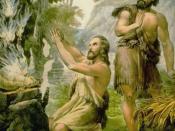Good vs. Evil "All novels, all poetry, are built on the never-ending contest in ourselves of good and evil" (p. 415). Chapter thirty-four relates to East of Eden because the author, Steinbeck, is expressing the theme. Steinbeck writes that life is classified as good or evil, regardless of any vices in the past or the personal status of class, gender, and ethnicity. This particular chapter basically lays out the theme of the characters. Steinbeck throughout the novel sort of categorizes the main characters as either good or evil. For example, the Cain and Abel story is a vital part of the novel. The Trask family was divided between the Cains and the Abels so to speak. Adam was the first one who was characterized as an "Abel."ÃÂ He was always doing the good thing. However, Charles his brother was characterized in resemblance to Cain. Then there was Aaron, one of two sons of Adam, who was considered the good son throughout the novel.
Cal, on the other hand, was mean. He also thought that he lacked the capacity to be good. This is why he prayed and asked God to prevent him from being mean.
This comparison of the main characters in relation with the good versus evil theme is expressed in this chapter with the narrator talking about the deaths of three men. The first two stories are about men who were rich and evil while alive, and were not missed by people, and that they (people) actually celebrated when they died. This is so because the people felt happy that they are no longer in their presence because of their evil actions. The theme of evil being disliked by others is clearly pointed out with this example. The last story was about a man who put others before himself. After this man's death, people were full of sorrow and feeling sad because this man's presence is no longer with them. These stories sum up the whole good versus evil theme because like the characters in the novel, Steinbeck expresses that good will reign over evil in the long run. Finally, the point of this chapter being used in the beginning of Part IV was intelligent by Steinbeck because it helps set a tone for the rest of the novel. It will help readers identify between the good in the novel and the bad in the novel.





